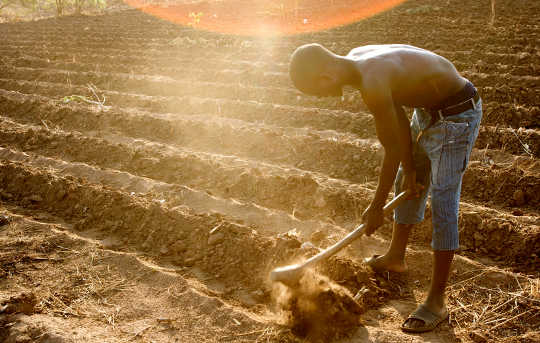
Photo Credit: Stephen Morrison/AusAID, Africa Food Security 15.(CC 2.0)
A unanimous decision on how to take action on climate change is incredibly rare. Yet, African nations have overwhelmingly included climate resilient agriculture in their indicative pledges to the United Nations. And agriculture is seen as a major focus through a common position of the African Union on climate adaptation.
Agriculture employs more than 60% of Africa’s working population. But low productivity and high levels of food insecurity persist. So the inclusion of agriculture in strategies should come as no surprise. The question is: how are African nations going to move from pledges to progress?
The Moroccan government, host of this year’s COP22 climate talks, is seeking the answer with the launch of the ambitious Adaptation of African Agriculture initiative. The initiative is high on the agenda. The aim is to mobilise $30 billion to make agriculture more resilient to the changing climate.
Improved water management
This is one of the three key pillars of the initiative – and for good reason. Globally, agriculture uses around 70% of freshwater supply. But water sources are increasingly under threat. Thanks to climate change, annual rainfall in some regions of Africa – especially southern and northern Africa – is expected to decrease. Droughts will be more frequent, more intense and will last longer.
Increasing the amount of water for agriculture through water storage at all levels from field to reservoir will be a part of the solution. But existing water sources also can be managed better. In fact, certain regions in Africa have untapped water. Take west Africa, for example, where Ghana withdraws less than 2% of the available surface and groundwater resources. Yet crops are still perishing when drought hits, and people are still going hungry.
The challenge across the region is to provide an environment that enables countries to draw on the water where needed and use it in the most effective and sustainable way possible. Where water supplies are already under pressure, improving the productivity of water use in agriculture would make more water available for other uses.
The urban, energy and industrial sectors can also encourage productivity gains and more sustainable and climate resilient practices through benefit sharing mechanisms like the Tana Water Fund.
Investment in water storage
Farmers will increasingly need to rely on water storage as part of the adaptation agenda. It is important to increase investment in a range of water storage techniques. Such techniques include banking groundwater during the wet season, harvesting rainwater and storing water in the ground by conserving soil moisture. In countries like India and Thailand for example, scientists are making progress on capturing floodwater underground, which can then be used for irrigation. Such measures can be considered alongside more conventional surface storage systems for buffering variability, like small farm ponds and large reservoirs.
Improved soil management practices have potential to both improve the utilisation of water and increase production. They are increasingly seen as a natural way to store carbon, turning soils into a carbon sink. This can open up new funding prospects that will have multiple benefits.
Adopting water management practices to a local context is crucial. This will improve resilience by bridging the dry spells that are increasingly occurring during the rainy season and increasing or opening up the opportunity for additional dry-season agricultural production. It’s also necessary to learn lessons from past projects where outcomes have not been effective.
More efficient use of water
Increasing yield per unit of water used will be critical for agricultural adaptation. New efficient irrigation technologies, like drip and sprinkler irrigation, are already showing much promise. For example, experience from Asia has shown that – when used in conjunction with high-yielding crop varieties and good soil management practices – yields and water savings have increased by 40% in the Coimbatore District of Tamil Nadu, India.
A training programme helped farmers to improve their knowledge of how to use and maintain subsidised drip irrigation systems. It also showed them fertigation techniques, in which fertiliser is applied to crops through the irrigation system. This is a precise and efficient method that saves both time and money.
One banana farmer was able to reduce the daily duration of irrigation from three hours to as little as an hour and 45 minutes. At the same time, his yields nearly doubled. The initiative is now being scaled up across the neighbouring region and has potential in many parts of Africa.
Getting advice to farmers
Farmers, as well as decision-makers and insurance firms, need improved information and early warning systems to better respond to climate variability. In Egypt, Sudan and Ethiopia, a new SMS system is being piloted, which is delivering field-specific information and advice in local languages.
Farmers can track crop growth and water efficiency and receive daily irrigation advice. In addition, online data portals enable local advisers to monitor the status of all individual registered fields. Based on observed differences between farms, or even within a single field, advisers can spot problems and help the farmer in need.
To implement these key strategies, significant funding will be required. Currently, Africa attracts only 5% of the world’s climate-related funding, even though 65% of the African population is directly exposed to the effects of climate change.
By harnessing climate funding for improved agricultural water management, African nations will reap multiple rewards. These rewards will be in the form of improved resilience to extreme weather events, and a food-secure future. Both of these are central to achieving the Sustainable Development Goals related to reducing hunger, improving health and livelihoods, as well as combating climate change.
The Morocco climate talks are a golden opportunity for making strides on the adaptation of African agriculture. African countries have made their commitment to this issue clear. They now need to be empowered with the tools and strategies for taking action.
Improved water management approaches may be just one piece of the puzzle, but will provide benefits for generations to come.
About The Author
Jeremy Bird, Director General, International Water Management Institute, International Water Management Institute
This article was originally published on The Conversation. Read the original article.
Related Books
at InnerSelf Market and Amazon





















